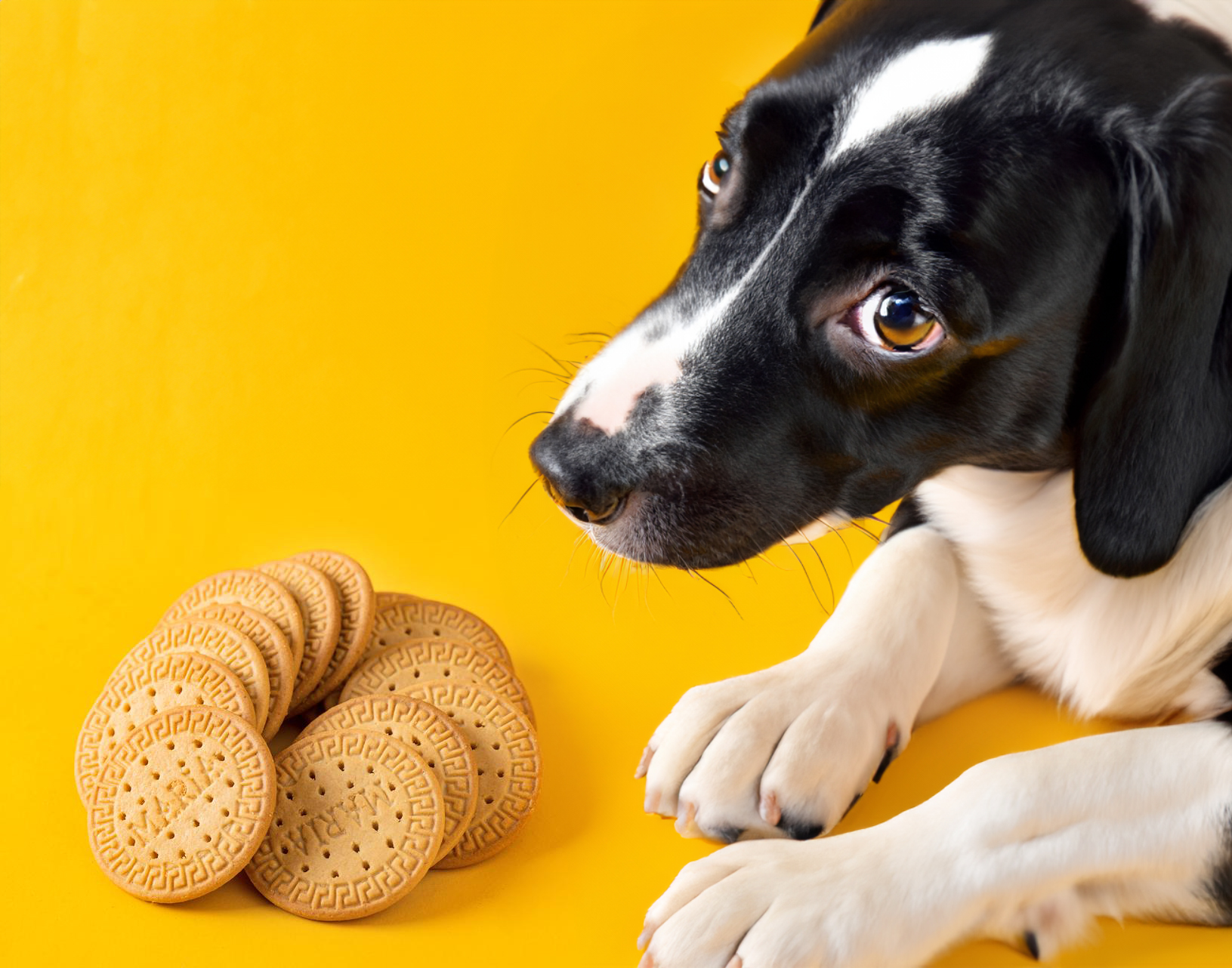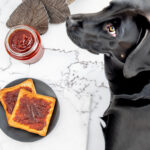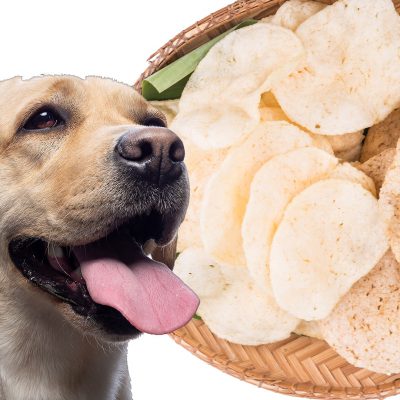We all want to show our furry friends some love, but what if that love comes in the form of a crunchy cookie? You may be wondering if it’s safe to give your pup a Marie biscuit as a snack, and you’re not alone. In this blog post, we’ll provide some insight into the cookie conundrum and help you decide whether your pup can munch on Marie biscuits. Keep reading to learn more!
What Are Marie Biscuits?
Marie biscuits are a popular type of cookie that originated in Europe and have since gained popularity around the world. These biscuits are known for their light and crispy texture, making them a favorite snack for many people.
Marie biscuits are made from wheat flour, sugar, vegetable oil, and various flavorings such as vanilla or lemon. They are typically round in shape with a pattern of small holes on top. The dough is rolled out, cut into circles, and then baked until golden brown.
One of the reasons Marie biscuits are so popular is their versatility. They can be enjoyed on their own as a simple snack, or they can be used in various recipes, such as cheesecake crusts or ice cream sandwiches. Their mild flavor and crispy texture make them a great addition to many desserts.
It’s important to note that Marie biscuits are not specifically formulated for dogs. They are made for human consumption and may contain ingredients that could be harmful or difficult for dogs to digest. Some ingredients, such as sugar or artificial flavorings, can be detrimental to a dog’s health if consumed in large quantities. Additionally, the crunchy texture of the biscuit may pose a choking hazard for some dogs, especially small breeds or those with dental issues.
Before giving your pup a Marie biscuit, it’s best to consult with your veterinarian to determine if it’s safe and appropriate for their diet.
Can Dogs Eat Them?
When it comes to treating our dogs, it’s important to be cautious and mindful of their dietary needs. So, can dogs eat Marie biscuits? The answer is not a straightforward yes or no. While Marie biscuits are not toxic to dogs, they are not specifically formulated for their nutritional needs either.
Marie biscuits contain ingredients such as sugar and artificial flavorings, which can be harmful to dogs if consumed in large quantities. Dogs have different nutritional requirements compared to humans, and their bodies may not be able to handle certain ingredients found in these biscuits. Moreover, the crunchy texture of the biscuit can pose a choking hazard, especially for small dogs or those with dental issues.
That being said, it doesn’t mean you have to completely banish Marie biscuits from your dog’s diet. If you still want to give your pup an occasional treat, it’s best to consult with your veterinarian beforehand. They can assess your dog’s individual needs and provide guidance on whether it’s safe to include Marie biscuits in their diet, and if so, in what quantities.
It’s always important to prioritize your dog’s health and well-being. Instead of relying solely on Marie biscuits, consider exploring healthier alternatives that are specifically made for dogs. There are many dog-friendly treats available in the market that are formulated to meet their nutritional requirements while still satisfying their taste buds. By choosing these options, you can ensure that your furry friend gets the love they deserve without compromising their health.
The Pros and Cons of Feeding Your Dog Marie Biscuits
Marie biscuits may be a beloved treat for humans, but when it comes to our furry friends, there are both pros and cons to consider before offering them these cookies.
On the pro side, Marie biscuits can be a tasty and convenient option for treating your dog. They are widely available and easy to find in most grocery stores. Their crispy texture can provide a satisfying crunch for your pup, and the mild flavor is generally appealing to dogs. Additionally, if your dog is not allergic to any of the ingredients in Marie biscuits, they may be able to enjoy them without any adverse effects.
However, there are also some cons to feeding your dog Marie biscuits. As mentioned earlier, these biscuits are not specifically formulated for dogs and may contain ingredients that are not ideal for their health. The high sugar content in Marie biscuits can contribute to weight gain and other health issues, such as diabetes or dental problems. Artificial flavorings and additives may also cause digestive upset in some dogs.
Furthermore, the crunchy texture of Marie biscuits can be a choking hazard, especially for smaller breeds or those with dental issues. Dogs who gulp down their food without chewing it properly may be at risk of choking on larger pieces of the biscuit.
Ultimately, the decision to feed your dog Marie biscuits should be made in consultation with your veterinarian. They can evaluate your dog’s specific dietary needs, consider any existing health conditions, and provide guidance on whether Marie biscuits can be incorporated into their diet, and if so, in what quantities.
Remember, prioritizing your dog’s health and well-being is always the most important consideration when it comes to selecting their treats and snacks.
Alternatives to Marie Biscuits for Your Furry Friend
If you’ve decided that Marie biscuits aren’t the best option for your dog, there are plenty of alternative treats that are both safe and nutritious for your furry friend. Here are some ideas to consider:
- Dog-Specific Treats: One of the best alternatives to Marie biscuits is to choose treats that are specifically made for dogs. These treats are formulated with ingredients that are safe and beneficial for your pup’s health. Look for options that are low in sugar, made with natural ingredients, and provide added benefits like dental care or joint support.
- Fresh Fruits and Vegetables: Many fruits and vegetables make excellent and healthy treats for dogs. Options like apple slices, carrot sticks, and blueberries are packed with vitamins and minerals while being low in calories. Just make sure to remove any seeds or pits and avoid toxic foods like grapes, onions, or avocado.
- Homemade Treats: If you enjoy cooking, why not try making your own dog treats? There are countless recipes available online that use simple, dog-friendly ingredients like peanut butter, pumpkin, and oats. This way, you have full control over what goes into your dog’s treats and can cater to their specific dietary needs.
- Frozen Treats: Especially during hot summer months, frozen treats can be a refreshing and enjoyable option for your dog. You can make your own by freezing diluted chicken or beef broth, or you can find frozen treats made specifically for dogs at your local pet store.
- Puzzle Toys: Instead of traditional treats, consider using puzzle toys to keep your dog mentally stimulated and entertained. These toys often have hidden compartments that you can fill with your dog’s regular kibble or special treats. This not only provides a fun challenge but also helps slow down fast eaters and promotes healthier eating habits.
Remember, when introducing any new treats or foods to your dog, it’s important to do so gradually and in moderation. Pay attention to your dog’s reactions and consult with your veterinarian if you have any concerns or questions. With the right alternatives, you can ensure that your furry friend is getting the love they deserve without compromising their health.
Tips for Safely Introducing New Foods to Your Dog
When introducing new foods to your dog, it’s important to take a cautious approach to ensure their safety and well-being. Here are some tips for safely introducing new foods to your furry friend:
- Start Slow: When introducing a new food to your dog, start with a small amount and monitor their reaction. Give them a small taste and observe for any signs of an allergic reaction or digestive upset. If they tolerate the food well, gradually increase the amount over time.
- One at a Time: Introduce new foods one at a time to easily identify any potential allergies or sensitivities. This way, if your dog has a negative reaction, you can easily pinpoint the specific food that caused it.
- Consult with Your Veterinarian: Before introducing any new foods to your dog’s diet, it’s always best to consult with your veterinarian. They can provide guidance based on your dog’s specific dietary needs, allergies, or health conditions.
- Avoid Harmful Foods: While it’s important to introduce new foods, it’s equally important to avoid foods that can be harmful or toxic to dogs. Some common foods to avoid include chocolate, grapes, onions, avocados, and anything containing artificial sweeteners like xylitol.
- Monitor Their Stool: Pay attention to your dog’s stool after introducing a new food. If you notice any changes in their bowel movements, such as diarrhea or constipation, it may be a sign that the new food is not agreeing with them.
- Be Mindful of Portion Sizes: When introducing new foods, be mindful of portion sizes. Treats should make up only a small portion of your dog’s overall diet. Overfeeding treats can lead to weight gain and other health issues.
By following these tips, you can safely introduce new foods to your dog’s diet and ensure that their nutritional needs are being met without compromising their health. Remember, every dog is different, so what works for one may not work for another. Always observe your dog’s individual reaction to new foods and adjust accordingly.








